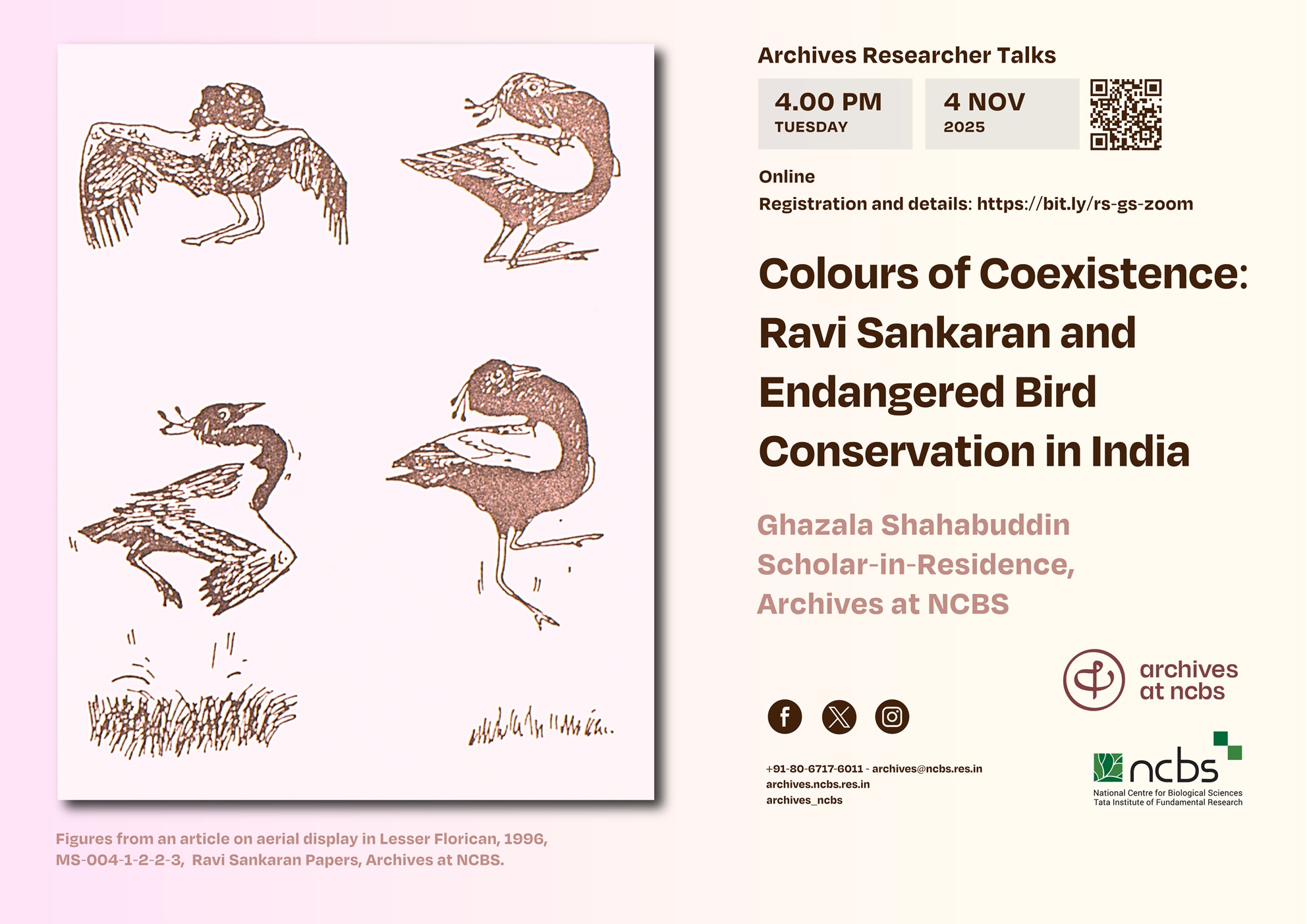Colours of Coexistence: Ravi Sankaran and Endangered Bird Conservation in India
Colours of Coexistence
Ravi Sankaran and Endangered Bird Conservation in India
Ghazala Shahabuddin
Scholar-in-Residence, Archives at NCBS
Nov 4, 2025, 4 PM IST
Online talk
Link and registration: https://bit.ly/rs-gs-zoom

Abstract:
Since Independence, the preservationist doctrine has been the principal guiding framework for wildlife conservation in India, advocating unconditional protection for wild species. Yet, during the late 20th century, human-wildlife coexistence emerged as a distinct possibility; there was even a rethinking of outright bans on hunting and ecosystem use. Ravi Sankaran (1963-2009), a prominent Indian ecologist, grappled with questions of human-bird coexistence, being one of the few biologists of his time to do so. While he was possessed of a passion and a penchant for unraveling the ecology of endangered birds surviving in remote areas, he also worked towards their conservation closely with marginalized communities who shared their habitats. Based on Ravi Sankaran’s papers in the Archives at NCBS, I will explore his vision for human-bird coexistence in three strikingly different social-ecological situations: the Lesser Florican (Central India), Edible-nest Swiftlet (Andaman & Nicobar Islands) and the Blyth’s Tragopan (Nagaland Hills). How did Sankaran visualize the possibilities of human cohabitation with wild birds, in a developing country beleaguered by the inordinate demands on land? Further, how did he use ecological science to incorporate socio-economic dimensions into real-life bird conservation? Finally, I will touch on his negotiations with wildlife policy of the time while he worked around these difficult questions.
Bio-note:
Ghazala Shahabuddin’s research interests lie at the cross-section of conservation science, wildlife history and policy. She has a PhD in Ecology and Conservation Biology from Duke University, USA (1998) for which she studied the ecology of forest fragmentation in Lago Guri, Venezuela. Since then, her work has expanded to the policy arena including pioneering work on conservation-induced displacement and community-based conservation in India which has been published extensively. Her book Conservation at the Crossroads (Permanent Black, 2010), critically analyzes contemporary wildlife policy and implementation in India. She has also co-edited other books including Nature in the New Economy (with K. Sivaramakrishnan; Orient Blackswan, 2019) and Making Conservation Work (with M. Rangarajan, Permanent Black, 2007). Ghazala has received the Aga Khan International Scholarship (1995-97), New India Fellowship (2007), and University of Pennsylvania’s Centre for Advanced Study of India Fellowship (2015). She worked as an Associate Professor at Dr. B.R. Ambedkar University in Delhi where she helped set up and taught at the School of Human Ecology from 2009-2014. Since August 2021, she has been a Visiting Professor to Environmental Studies at Ashoka University, India and in 2024, she joined as Scholar-in-Residence of the Archives at NCBS. She is currently researching the practice of bird research and conservation in India, as well as leading a long-term field study on anthropogenic environmental change in oak forests of the Western Himalayas.


